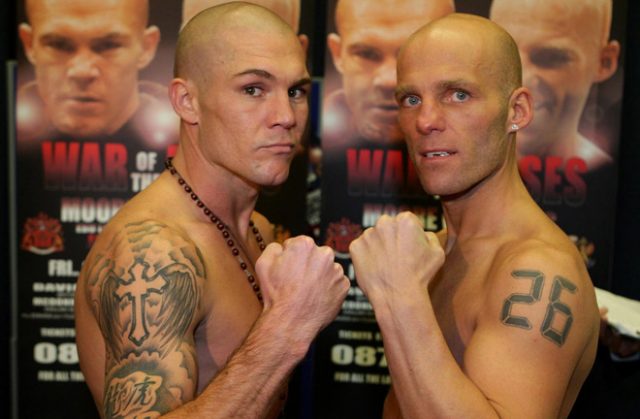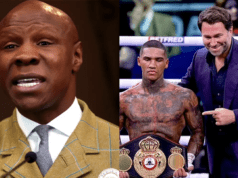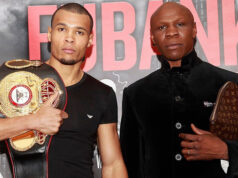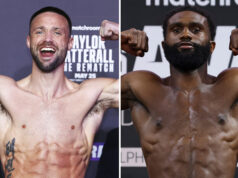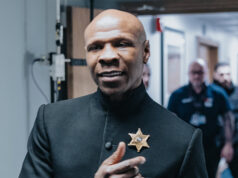October 2009 saw two men on the fringe of World title level collide in Bolton in a war of the roses. One man had already been agonisingly close at world level very early on in his career, and the other was having an Indian Summer to his career, and was on the cusp of a title shot that he had craved for so long.
Jamie Moore v Ryan Rhodes – European Super Welterweight Title, Bolton Arena, 23rd October 2009
Yorkshire was represented by Sheffield’s Ryan Rhodes, who was having a second career of sorts at age 33. Rhodes was a product of the famous Wincobank Gym under the watchful eye of renowned trainer Brendan Ingle, who was responsible for the unearthing of Prince Naseem Hamed.
Rhodes turned professional at the age of just 18 in February 1995, stopping Lee Crocker in Cardiff on the undercard of a Steve Robinson World title defence.
After ten straight wins, Rhodes was pitched in with the vastly more experienced Paul ‘Silky’ Jones for the vacant British Super Welterweight title in a Sheffield derby.
Jones was fresh off winning the WBO World title in his previous contest, winning a majority decision against Verno Phillips. Rhodes didn’t care much for Jones’ reputation, and stopped him in eight rounds to become British champion at just 20 years of age.
Ryan Rhodes faced Paul ‘Silky’ Jones. Photo Credit: Bleacher Report
Rhodes would secure a Lonsdale Belt outright in just a record 90 days, stopping Peter Waudby in a round, and Del Bryan in seven as his career began to take off.
Rhodes was heavily involved with the Wincobank, and Hamed in particular, and affectionately came to be known by ‘The Spice Boy’ moniker.
Three straight stoppage wins at continental level secured a shot at the WBO belt, but Rhodes found the Canadian Otis Grant too much of an obstacle to over come, and was denied in a tight points loss in Sheffield.
Moving up to Middleweight saw three wins on the bounce, and July 1999 saw a second World title shot, with Hackney’s Jason Matthews coming in at less than a weeks notice to replace the WBO champion, Bert Schenk, who was injured.
With the vacant belt on the line, Matthews stunned Rhodes with a shock second round knockout win, following a heavy opening round knockdown.
Rhodes would be forced to rethink, and he would win six on the spin against low level opposition, but would be stunned yet again by the unheralded Lee Blundell in three rounds in March 2002 to leave his career at a crossroads.
Ryan continued, and strung another ten wins together, again against limited opposition, but was undone in a challenge for the WBU strap in July 2006 when Gary Lockett took a unanimous decision.
The Rhodes renaissance began with a decision to gradually get back down to his native Super-Welterweight division, and three wins gave him a shot at the British title that he last contested some eleven years previously.
The ninth-round knockout of Gary Woolcombe welcomed Rhodes back to the big time.
A wide win over Jamie Coyle and then a ranking boosting WBC International title win in November 2008 against Vincent Vuma got Ryan at the top end of the world rankings.
2009 saw a rust shaking win over Janos Petrovics in April, and this set the scene for a domestic showdown with a massive incentive on the line for the winner.
October 2009 would be Rhodes’ shot at the European title, and the match would double as an eliminator for a shot at the WBC crown.
Ryan Rhodes and Jamie Moore in action. Photo Credit: Boxing Scene
In Rhodes’ way would be Salford’s Jamie Moore, who himself had been round the block, and was on course for a fully merited maiden World title shot.
Moore had endured many ups and downs in a ten year career that began in 1999. His experiences had certainly learned him, and he came back from some devastating lows to rejuvenate his career.
An early career knockout loss to Scott Dixon was forgotten when five fights later, Moore won the British and Commonwealth belts in a wide points win against Michael Jones.
Stoppage defences against Gary Logan and Andrew Facey, and a Commonwealth defence against Adam Katumwa, also via the short route made Moore a man to keep an eye on.
This progress came to a shuddering halt though against the lightly regarded Ossie Duran. The Ghanaian knocked out Moore in three. It was later discovered that Moore was carrying a hip injury.
It was unluckily two defeats on the trot for Moore in November 2004, as he also lost his Lonsdale Belt against old foe Michael Jones when he was disqualified for hitting on the break in the third.
Jamie Moore would have to wait eight months for a rematch, and would be forced to get off the canvas twice before decking Jones three times himself in a sixth round stoppage.
Jamie Moore faced Matt Macklin in a classic. Photo Credit: Sky Sports
That win would spark a twelve fight winning streak, including British defences against David Walker (TKO4) and an all time classic tenth round knockout of Matthew Macklin, as well as a rematch stoppage win against Andrew Facey.
Come March 2009, Moore was at his apex, and he went up against former IBF World champion Michele Piccirillo in a real acid test for the Italian’s European strap.
A wicked left to the body forced Piccirillo out for the count, and Moore was climbing the world rankings himself.
Then a second round stoppage defence two months later against Roman Dzhuman set up a mouth watering clash with Rhodes, and it certainly didn’t disappoint.
In a back and forth contest a dramatic ending was the result. I urge you to witness it for yourselves.


